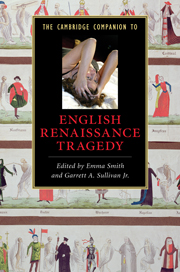Book contents
- Frontmatter
- Part 1 Themes
- 1 English Renaissance tragedy: theories and antecedents
- 2 Tragedy, family and household
- 3 Tragedy and the nation state
- 4 Tragedy and religion
- 5 Tragedy and revenge
- 6 Tragic subjectivities
- 7 Tragic forms
- 8 Tragedy and performance
- 9 Renaissance tragedy on film: defying mainstream Shakespeare
- 10 Shakespeare and early modern tragedy
- Part II Readings
- Index
2 - Tragedy, family and household
from Part 1 - Themes
Published online by Cambridge University Press: 28 November 2010
- Frontmatter
- Part 1 Themes
- 1 English Renaissance tragedy: theories and antecedents
- 2 Tragedy, family and household
- 3 Tragedy and the nation state
- 4 Tragedy and religion
- 5 Tragedy and revenge
- 6 Tragic subjectivities
- 7 Tragic forms
- 8 Tragedy and performance
- 9 Renaissance tragedy on film: defying mainstream Shakespeare
- 10 Shakespeare and early modern tragedy
- Part II Readings
- Index
Summary
The opening of John Ford's 1633 play 'Tis Pity She's a Whore raises questions about the connections between the closeness of family ties, the private spaces of the household and the nature of tragedy. It begins with a shocking discussion between Giovanni, son of Florio, a citizen of Parma, and a Friar. Giovanni has 'unclasped [his] burdened soul' and 'Emptied the storehouse of [his] thoughts and heart' about his love, but the Friar is appalled by what he hears (1.1.13-14). The love Giovanni describes is a passionate one for his sister Annabella with whom he goes on to have a relationship that leaves her pregnant, and he tries to justify his feelings to the Friar by explaining the closeness of the relationship between a brother and a sister:
Say that we had one father, say one womb / (Curse to my joys) gave both us life and birth; / Are we not therefore each to other bound / So much the more by nature? by the links Of blood, / of reason? nay, if you will have't, / Even of religion, to be ever one, / One soul, one flesh, one love, one heart, one all?
(1.1.28-34)The Friar, not surprisingly, does not think much of Giovanni's logic, and rather than appreciating the bonds of a shared parentage as the basis for a sexual relationship, he tells Giovanni that he's damned.
- Type
- Chapter
- Information
- The Cambridge Companion to English Renaissance Tragedy , pp. 17 - 29Publisher: Cambridge University PressPrint publication year: 2010
- 3
- Cited by

